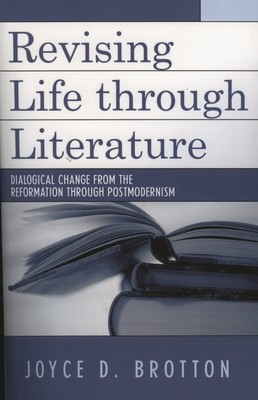
- We will send in 10–14 business days.
- Author: Joyce D Brotton
- Publisher: Scarecrow Press
- ISBN-10: 0810857197
- ISBN-13: 9780810857193
- Format: 14.2 x 21.8 x 1.5 cm, softcover
- Language: English
- SAVE -10% with code: EXTRA
Reviews
Description
After the Reformation, science superseded both religion and literature as the favored source of knowledge. As people became free of a catechism of rote responses, they found the concept of self-determination both liberating and terrifying. Literature stepped in by providing examples of fictional characters that made choices in circumstances similar to the quandaries faced by readers-situations that could not be easily resolved by scripture alone. As a critical theory, dialogism makes our literary heritage germane. It offers a strategy for readers to improve their immediate lives through literary insights. It also offers a means to employ literary theory to reveal overlooked clues and lingering inhibitions embedded in past literature that can affect the reader's present life. In Revising Life Through Literature: Dialogical Change from the Reformation through Postmodernism, Joyce Brotton cites topical examples of the past several centuries to argue the relevancy of literary works to everyday existence. Each chapter opens with a philosophical background that identifies conflict arising from a dichotomy between religion and science, followed by a literary discussion of works that respond to the needs of that age. Included in her discussion are King Lear, The Duchess of Malfi, Paradise Lost, Candide, Wuthering Heights, and Adam Bede. More recent examples include James Joyce's Ulysses, John Fowles' The French Lieutenant's Woman, Julian Barnes' The History of the World in 10 1/2 Chapters, and Margaret Atwood's The Blind Assassin. This book is more than a teaching vehicle; it focuses on the parallel power of the imagination to create situations that may not reflect exactly the reader's own needs, but can boost confidence by offering a range of options for coping with life. This absorbing, entertaining, and informative resource encourages readers to use literature for relevancy rather than as a mere distraction.
EXTRA 10 % discount with code: EXTRA
The promotion ends in 17d.21:42:32
The discount code is valid when purchasing from 10 €. Discounts do not stack.
- Author: Joyce D Brotton
- Publisher: Scarecrow Press
- ISBN-10: 0810857197
- ISBN-13: 9780810857193
- Format: 14.2 x 21.8 x 1.5 cm, softcover
- Language: English English
After the Reformation, science superseded both religion and literature as the favored source of knowledge. As people became free of a catechism of rote responses, they found the concept of self-determination both liberating and terrifying. Literature stepped in by providing examples of fictional characters that made choices in circumstances similar to the quandaries faced by readers-situations that could not be easily resolved by scripture alone. As a critical theory, dialogism makes our literary heritage germane. It offers a strategy for readers to improve their immediate lives through literary insights. It also offers a means to employ literary theory to reveal overlooked clues and lingering inhibitions embedded in past literature that can affect the reader's present life. In Revising Life Through Literature: Dialogical Change from the Reformation through Postmodernism, Joyce Brotton cites topical examples of the past several centuries to argue the relevancy of literary works to everyday existence. Each chapter opens with a philosophical background that identifies conflict arising from a dichotomy between religion and science, followed by a literary discussion of works that respond to the needs of that age. Included in her discussion are King Lear, The Duchess of Malfi, Paradise Lost, Candide, Wuthering Heights, and Adam Bede. More recent examples include James Joyce's Ulysses, John Fowles' The French Lieutenant's Woman, Julian Barnes' The History of the World in 10 1/2 Chapters, and Margaret Atwood's The Blind Assassin. This book is more than a teaching vehicle; it focuses on the parallel power of the imagination to create situations that may not reflect exactly the reader's own needs, but can boost confidence by offering a range of options for coping with life. This absorbing, entertaining, and informative resource encourages readers to use literature for relevancy rather than as a mere distraction.


Reviews